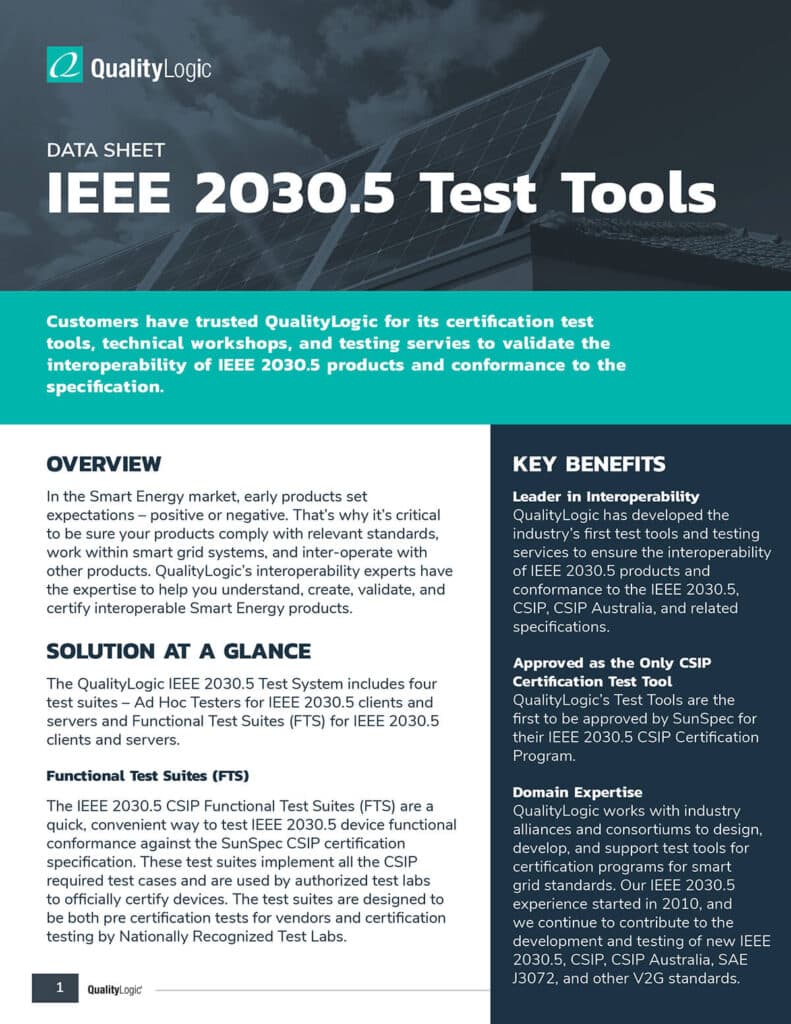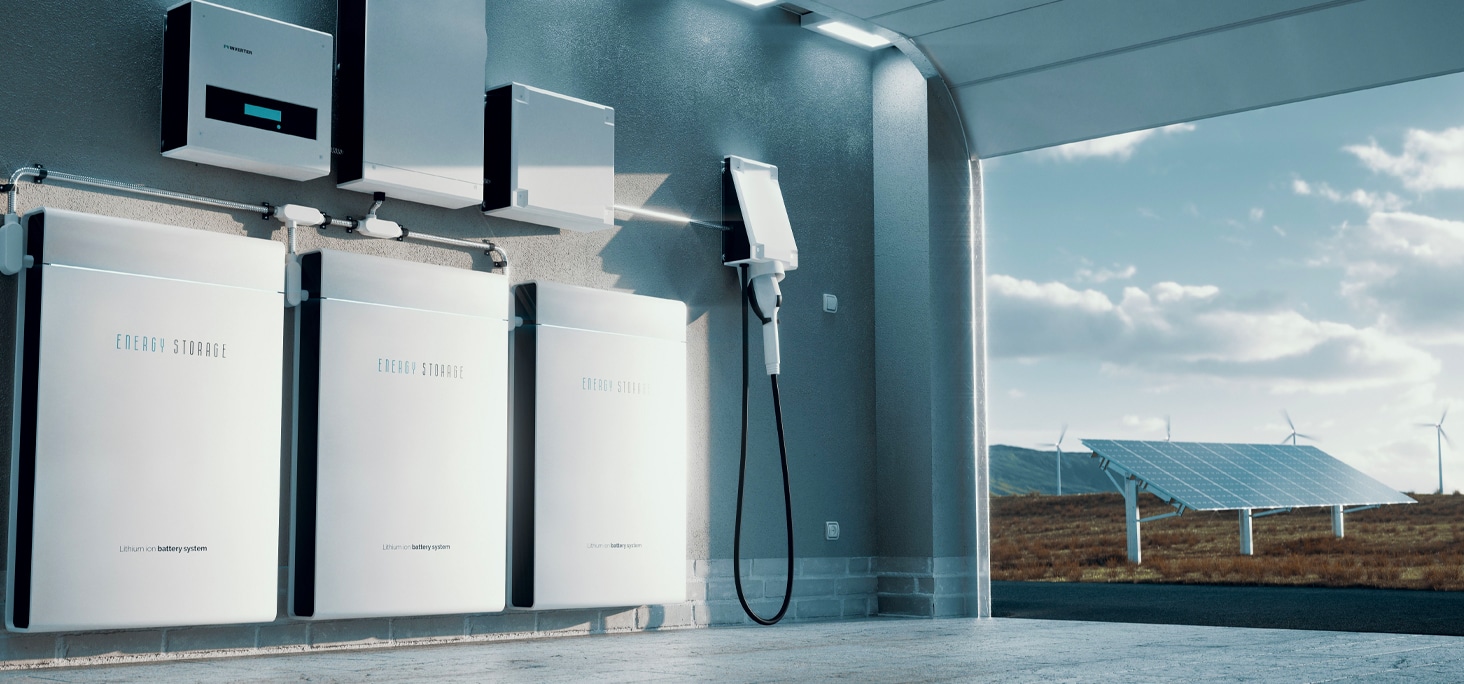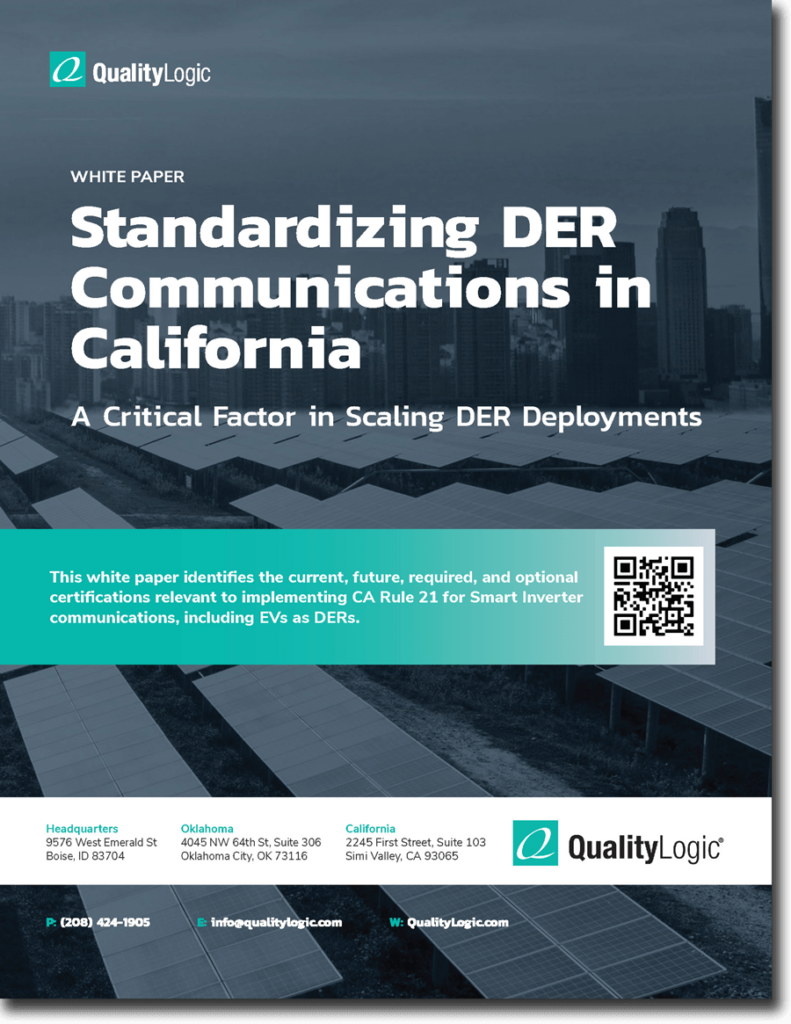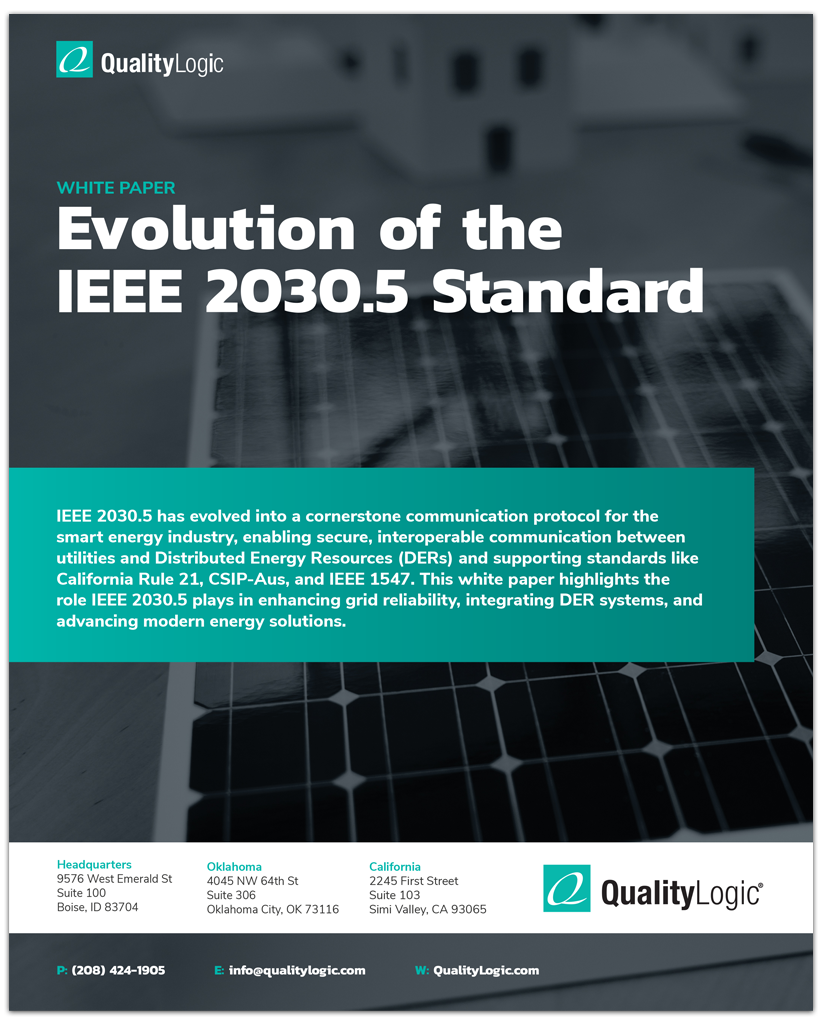IEEE 2030.5 Test Tools
Understand, Create, Validate, and Certify Interoperable IEEE 2030.5 Products
QualityLogic’s IEEE 2030.5 Test Tools set the standard for protocol conformance and interoperability testing. For CA Rule 21, CSIP, CSIP Australia, and emerging DER and EV IEEE 2030.5 applications, you can count on QualityLogic to ensure your products are interoperable and certifiable.
IEEE 2030.5 Test Tools
QualityLogic’s interoperability experts help you understand, create, validate and certify interoperable smart energy products. QualityLogic has developed the industry’s first IEEE 2030.5 test tools and testing services for smart energy vendors to ensure interoperability and conformance to the specification. The QualityLogic IEEE 2030.5 Test System provides both a protocol conformance test system (Functional Test Suite or FTS) and interoperability test system (Ad Hoc) for IEEE 2030.5 clients and servers.
IEEE 2030.5 Test System is ideal for vendors who are looking to be certified for CA Rule 21/CSIP and CSIP Australia compliance and those who are looking to test other Smart Energy functions such as Demand Response, Pricing, Energy Flow Reservation, Messaging, Metering, and SAE J3072 V2G. The current version of the test tools support the CA Rule 21/CSIP and CSIP Australia smart inverter communications requirements.

IEEE 2030.5 Functional Test Suites
The QualityLogic IEEE 2030.5 Functional Test Suites are a quick, convenient way to test IEEE 2030.5 client or server conformance to the IEEE 2030.5-2018 Standard. Test Suites cover all of the tests defined in the SunSpec CA Rule 21 Test Procedures including Aggregator, Server and End-Client (Inverter) certification tests. These tests include:
- Communication fundamentals
- Core function set
- Basic functions
- Utility server aggregator model
- Aggregator operation
- Error handling
- Maintenance of model tests
API Now Standard
The Client FTS API is now a standard feature of our test tools. The QualityLogic API offers new capabilities in the FTS tools, including the ability to remotely retrieve status and test logs, as well as integrate the QualityLogic test tools into your regression test system.
New! CSIP Australia
QualityLogic’s IEEE 2030.5 Test Tools and Technical Workshops set the standard for protocol conformance, interoperability testing, and essential technical training. And with the emergence and evolution of CSIP Australia, the DER industry is trusting QualityLogic to ensure their products are interoperable and certifiable.
Our CSIP-Aus tool offers a streamlined approach to expedite your efforts in testing and certifying your DER systems.
- All Tests required for all DER systems
- ConnectionPoint Tests
- Generation Tests
- Load/Import Tests
- DemandResponse – AS 4755 Demand Response functions
- Support for all CSIP-Aus required controls and exchanges
- Physical Response Verification
IEEE 2030.5 Ad Hoc Testers
IEEE 2030.5 Ad Hoc Testers are actual conformant implementations of IEEE 2030.5 Client and Server. They provide an additional testing pathway to the Functional Test Suites that give full control over the type of events that can be created to target specific client devices such as CA Rule 21/CSIP DER clients and servers.
Ad Hoc Client Tester simulates a utility DERMS to enable the Rule 21 CALSSA Testing Pathway certification, the testing of Rule 21 Phase 3 Functions 2 and 3, and the new IEEE 1547.1 Interop testing using IEEE 2030.5. The Ad Hoc Testers also provide support for Demand Response, Pricing, Metering and other Smart Energy functions for broad 2030.5 test coverage. The tools simulate “golden reference” implementations of IEEE 2030.5 compliant products to conduct interoperability testing. The Ad Hoc testers are valuable for exploring use case scenarios. You can use real devices from other vendors or simulate devices or head-end servers that would be in real-world installations.
J3072 IEEE 2030.5 Profile Test Tool
Based on the industry-leading IEEE 2030.5 test tool, the SAE J3072 IEEE 2030.5 profile is now supported as a client or server to test against. This profile was jointly developed by the Society of Automotive Engineers (SAE) and SunSpec Alliance along with their respective members, including QualityLogic. The J3072 test tool implements both the EVSE (server) and PEV (client) profiles defined in the J3072 IEEE 2030.5 Profile. This test tool provides the user with a convenient and familiar interface to test their J3072 IEEE 2030.5 implementations, including the ability to specify various V2G functions.
Supported features include:
- User-selectable mDNS service discovery and ipV6 networking support
- Configurable PEV site limit from the EVSE
- EVSE’s authorization for PEV to discharge
- Support for all mandatory and optional IEEE 2030.5 function sets
- Support for all Management Information setpoints from EVSE, including 1547 functions
IEEE 2030.5 Comprehensive Test Suite
CA Rule 21 has driven global adoption of CSIP-based systems in the DER industry, including smart inverters, aggregators, facility EMS and DER Management Systems. As the industry deploys different implementations of CSIP-based products, it has seen consistent interoperability issues from CSIP-certified systems. QualityLogic has a proven record of developing different levels of test suites to validate conformance and interoperability to technology standards. To improve the interoperability and maturity of IEEE 2030.5 CSIP-based systems, QualityLogic is introducing a new test suite to the industry – IEEE 2030.5 Comprehensive Test Suite, which offers the following benefits:
- Deep and wide test coverage compared to the CSIP certification tests to expose the manufacturer’s technical gaps, errors, and lack of robustness during the R&D phase.
- These tests implement use cases that are not covered in the CSIP certification tests but are still technically valid according to the IEEE 2030.5 and CSIP specifications.
- Scalability tests that challenge the DUT with significantly large or complex scenarios
- Error scenarios that present the DUT with different error situations that may occur out in the field but are not encountered during SunSpec CSIP certification testing.
- Coverage of mandatory and optional behaviors specified in the IEEE 2030.5 standard to validate the DUT’s conformance to all the requirements and not just the situations included in SunSpec CSIP Test Procedures.
- Ability to test for potential interoperability issues in a private lab environment by using the new CTS test suite with your DUT – without needing to interop with another vendor.
Ensure Successful CA Rule 21 Certification
QualityLogic’s IEEE 2030.5 Test Tools support multiple applications of IEEE 2030.5. Our most recent version is focused on the CA Rule 21 IEEE 2030.5 requirements defined by the SunSpec CSIP Test Specification. In order to better serve our customers in their CA Rule 21 efforts, we have developed Test Application Guides to assist with the evolving requirements.
The QualityLogic test tools can also be used for the CALSSA Testing Pathway test process, as well as for generating the Phase 3 Functions 2 and 3 IEEE 2030.5 test messages. The Guides provide detailed instructions for the use of our test tools in each use case. For instance, the CALSSA specified test cases are already a standard part of our Client FTS Tester and just need to be selected to simulate the correct messages from a utility DERMS server. And QualityLogic’s Ad Hoc Client Tester already supports all of the IEEE 2030.5 messaging functions required for the Phase 3 Functions 2 and 3 test messaging.
Standardizing DER Communications in California
UPDATED JANUARY 2023
Given the variety of interests and opinions about what testing and certifications advance the efficiency and interoperability of deploying DER communications infrastructure, the landscape of standards and certifications can be confusing. This paper identifies the current, future, required, and optional certifications relevant to implementing CA Rule 21 for Smart Inverter communications.
Evolution of the IEEE 2030.5 Standard
RELEASED NOVEMBER 2024
As clean energy adoption continues to grow, robust communication standards are essential for creating a smarter, more reliable grid. The IEEE 2030.5 standard has become a cornerstone of global energy communication, enabling secure, interoperable connections between utilities and Distributed Energy Resources (DERs) such as solar panels, batteries, and electric vehicles.
Our latest white paper examines the critical role IEEE 2030.5 plays in modernizing energy systems. This resource offers practical insights for utility professionals, OEMs, and energy sector stakeholders navigating today’s evolving energy landscape.
IEEE 2030.5 Technical Support
The IEEE 2030.5 Developer’s Workshop provides a conceptual understanding of IEEE 2030.5, a technical walk-through of IEEE 2030.5, training on QualityLogic’s test tools, and best practices for conformance and interoperability testing of IEEE 2030.5.
QualityLogic Technical Support is invaluable for developers who are working to implement IEEE 2030.5, or implementers who are using the standard in a pilot, demonstration or deployment project. Since Tech Support provides quick answers to technical questions, it saves time and costs in developing or deploying the technology.
Test planning, development, and execution of IEEE 2030.5 implementations are valuable time- and money-saving services that ensure the quality of products. Integration testing leverages QualityLogic’s test tools to identify interoperability issues and provide detailed engineering information to developers.
Custom test tool development can include enhancements to QualityLogic’s test tools, integration with other tools, or development of tools for unique requirements. For example, some vendors or integrators may need tools that simulate hundreds of IEEE 2030.5 clients. QualityLogic starts with its current knowledge and test tool technology to quickly develop such a tool.
Interested in learning more? Contact us using the form below, or visit the QualityLogic Smart Energy store.
IEEE 2030.5 Test Tool Maintenance Contracts
QualityLogic has a standing commitment to ensure that our IEEE 2030.5 Test Tools continue to capture updates to the CSIP IEEE 2030.5 Test Specification and remain up to date for conformance and interoperability testing for the IEEE 2030.5 protocol in general.
Updates to our Test Tools range from bug fixes to the addition of new features and are categorized as follows: Maintenance Updates, Minor Updates, and Major Updates.
Adding a Maintenance Contract to your IEEE 2030.5 Test Tools will allow you to receive all Maintenance Updates and Minor Updates we publish without additional charge, and it will also allow you discounted pricing for any Major Update we publish. We estimate that approximately 2-3 updates will be made to the Test Tools per year over the next few years.
To purchase an IEEE 2030.5 Test Tool Maintenance Contract or talk more about its value, please fill out the form below or visit the QualityLogic online store.
Ready to Learn More About Our IEEE 2030.5 Test Tools?
Frequently Asked Questions About IEEE 2030.5
What functionality will the initial implementation of IEEE 2030.5 have?
The initial implementation of the IEEE 2030.5 protocol will focus on addressing the most pressing needs, particularly those related to California Rule 21. This means prioritizing the Common Smart Inverter Profile (CSIP), a crucial subset of the broader IEEE 2030.5 standards. This initial phase will ensure compliance with essential grid communication requirements.
As we achieve this foundational functionality, additional capabilities will be incorporated, extending the protocol’s scope and enhancing its overall effectiveness in supporting smart grid operations.
What is IEEE 2030.5, and what is it used for?
IEEE 2030.5 is a standard, XML-based application protocol used primarily to manage Distributed Energy Resources (DERs) such as energy storage, rooftop solar panels, and Vehicle to Grid EV charging. As DER interconnections become increasingly reliant on IEEE 2030.5 (for example, California Rule 21), this standard ensures future DERs provide grid services efficiently, scalably, and interoperably.
QualityLogic’s IEEE 2030.5 Test Tools set the standard for protocol conformance and interoperability testing. For CA Rule 21, CSIP, CSIP Australia, and emerging DER and EV IEEE 2030.5 applications, you can count on these tools to ensure your products are interoperable and certifiable.
QualityLogic’s interoperability experts help you understand, create, validate and certify interoperable smart energy products. QualityLogic has developed the industry’s first IEEE 2030.5 test tools and testing services for smart energy vendors to ensure interoperability and conformance to the specification. The QualityLogic IEEE 2030.5 Test System provides both a protocol conformance test system (Functional Test Suite or FTS) and interoperability test system (Ad Hoc) for IEEE 2030.5 clients and servers.
The IEEE 2030.5 Test System is ideal for vendors who are looking to be certified for CA Rule 21/CSIP and CSIP Australia compliance and those who are looking to test other Smart Energy functions such as Demand Response, Pricing, Energy Flow Reservation, Messaging, Metering, and SAE J3072 V2G. The current version of the test tools supports the CA Rule 21/CSIP and CSIP Australia smart inverter communications requirements.
How Does IEEE 2030.5 Differ from Other Protocols Like OpenADR?
IEEE 2030.5 and OpenADR are both protocols used in the energy sector, but they serve different purposes and operate in unique ways. Understanding these differences can help you choose the right protocol for your needs.
Read on for more general information, but choosing between IEEE 2030.5 and OpenADR depends on your specific needs. We’d be happy to talk through this with you, or you can also download our DER Communication Protocol Selection Guide.
Device-Specific Functionality
IEEE 2030.5 focuses on device-specific functionalities. This makes it highly adaptable for a wide range of applications, from being embedded in client-side devices to performing as a server within utility operations. This versatility allows for diverse deployment scenarios across various components of the energy ecosystem.
OpenADR, on the other hand, is designed primarily for demand response. It facilitates communication between utilities and end-users to effectively manage energy loads, particularly during peak demand periods.
Flexibility and Deployment
The adaptability of IEEE 2030.5 means it can be integrated directly into devices, making it ideal for systems that require device-level control and monitoring. This flexibility is essential for enabling smart grid solutions that are responsive and scalable.
OpenADR is more rigid in its structure, focusing on automating the demand response processes. It is typically used by utilities to signal load reduction requests to customers using automated, standardized communications.
Focus and Use Cases
By concentrating on device-level functionality, IEEE 2030.5 supports a wide spectrum of applications, from home energy management systems to large-scale utility operations.
OpenADR is specialized for energy demand response, helping balance supply and demand by sending signals to adjust energy consumption during critical times. It is less about integrating a variety of devices and more about enabling efficient energy use at scale.
Choosing between IEEE 2030.5 and OpenADR depends on your specific needs. We’d be happy to talk through this with you, or you can also download our DER Communication Protocol Selection Guide.




